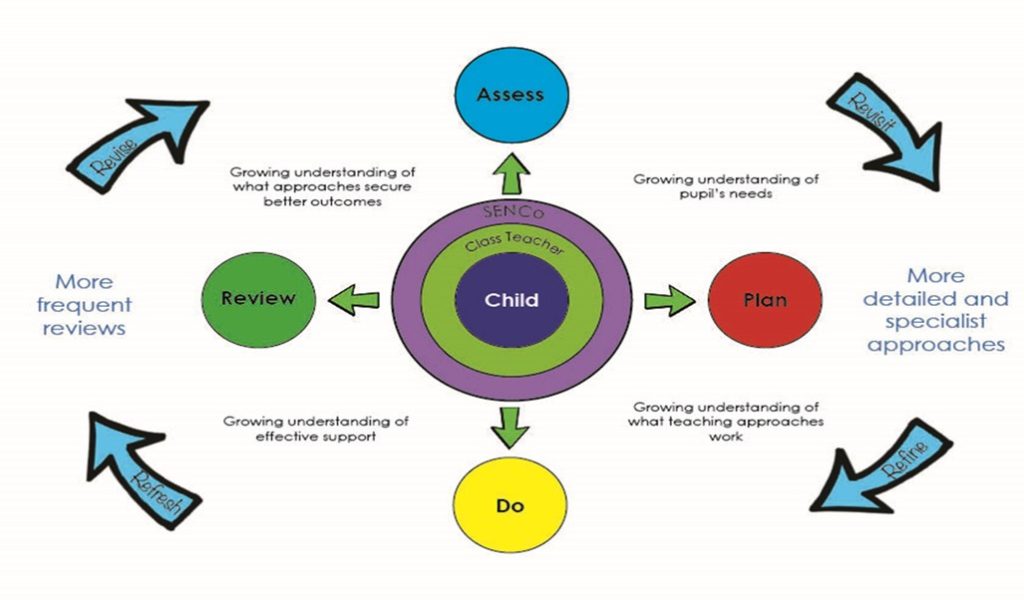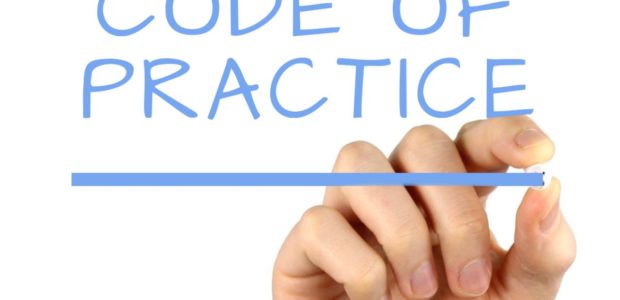The Code of Practice provides statutory guidance on duties, policies and procedures relating to Part 3 of the Children and Families Act 2014 and associated regulations and applies to England.
It relates to children and young people with special educational needs (SEN) and disabled children and young people.
In the Code of Practice, where the text uses the word must it refers to a statutory requirement under primary legislation, regulations or case law.
The Code of Practice is comprised of 290 pages split into 11 chapters.
Chapter 6 – Schools
1. Improving outcomes: high aspirations and expectations for children and young people with SEN
- All children and young people are entitled to an appropriate education, one that is appropriate to their needs, promotes high standards and the fulfilment of potential
- Every school is required to identify and address the SEN of the pupils that they support.
- They must:
- use their best endeavours to make sure that a child with SEN gets the support they need – this means doing everything they can to meet children and young people’s SEN
- ensure that children and young people with SEN engage in the activities of the school alongside pupils who do not have SEN
- designate a teacher to be responsible for co-ordinating SEN provision – the SEN co-ordinator, or SENCO
- inform parents when they are making special educational provision for a child
- prepare an SEN information report and their arrangements for the admission of disabled children, the steps being taken to prevent disabled children from being treated less favourably than others, the facilities provided to enable access to the school for disabled children and their accessibility plan showing how they plan to improve access progressively over time
- There should be a member of the governing body or a sub-committee with specific oversight of the school’s arrangements for SEN and disability
2. Equality and inclusion
- Schools support pupils with a wide range of SEN
- All schools have duties under the Equality Act 2010 towards individual disabled children and young people. They must make reasonable adjustments, including the provision of auxiliary aids and services for disabled children, to prevent them being put at a substantial disadvantage
3. Medical Conditions
- The Children and Families Act 2014 places a duty on maintained schools and academies to make arrangements to support pupils with medical conditions
4. Curriculum
- All pupils should have access to a broad and balanced curriculum
5. Careers guidance for children and young people
- Maintained schools and PRUs must ensure that pupils from Year 8 until Year 13 are provided with independent careers guidance
6. Identifying SEN in schools
- All schools should have a clear approach to identifying and responding to SEN
- A pupil has SEN where their learning difficulty or disability calls for special educational provision, namely provision different from or additional to that normally available to pupils of the same age
- Class and subject teachers, supported by the senior leadership team, should make regular assessments of progress for all pupils
- The first response to such progress should be high quality teaching targeted at their areas of weakness. Where progress continues to be less than expected the class or subject teacher, working with the SENCO, should assess whether the child has SEN
- Slow progress and low attainment do not necessarily mean that a child has SEN and should not automatically lead to a pupil being recorded as having SEN
- The four broad areas give an overview of the
range of needs that should be planned for
- Communication and Interaction
- Cognition and Learning
- Social, Emotional and Mental Health difficulties
- Sensory and/or physical needs
7. Special education provision in schools
- Teachers are responsible and accountable for the progress and development of the pupils in their class, including where pupils access support from teaching assistants or specialist staff
- High quality teaching, differentiated for individual pupils, is the first step in responding to pupils who have or may have SEN. Additional intervention and support cannot compensate for a lack of good quality teaching
- Information gathering should include an early discussion with the pupil and their parents
- Where it is decided that a pupil does have SEN, the decision should be recorded in the school records and the pupil’s parents must be formally informed that special educational provision is being made
8. SEN Support in schools
- Where a pupil is identified as having SEN, schools should take action to remove barriers to learning and put effective special educational provision in place

- This SEN support should take the form of a four-part cycle (The Graduated Approach) through which earlier decisions and actions are revisited, refined and revised with a growing understanding of the pupil’s needs and of what supports the pupil in making good progress and securing good outcomes
9. Transition
- SEN support should include planning and preparation for the transitions between phases of education and preparation for adult life
10. Involving specialists
- Where a pupil continues to make less than expected progress, despite evidence based support and interventions that are matched to the pupil’s area of need, the school should consider involving specialists, including those secured by the school itself or from outside agencies
- Schools may involve specialists at any point to advise them on early identification of SEN and effective support and interventions
- The pupil’s parents should always be involved in any decision to involve specialists
- Where assessment indicates that support from specialist services is required, it is important that children and young people receive it as quickly as possible
- The SENCO and class teacher, together with the specialists, and involving the pupil’s parents, should consider a range of evidence-based and effective teaching approaches, appropriate equipment, strategies and interventions in order to support the child’s progress
11. Requesting an Education, Health and Care needs assessment
- Where, despite the school having taken relevant and purposeful action to identify, assess and meet the SEN of the child or young person, the child or young person has not made expected progress, the school or parents should consider requesting an Education, Health and Care needs assessment
12. Involving parents and pupils in planning and reviewing progress
- Schools must provide an annual report for parents on their child’s progress
- Where a pupil is receiving SEN support Schools should meet parents at least three times each year to set clear outcomes and review progress
- These discussions should be led by a teacher with good knowledge and understanding of the pupil who is aware of their needs and attainment
- These discussions will need to allow sufficient time to explore the parents’ views and to plan effectively as well as seek the views of the pupil
13. Use of data and record keeping
- The provision made for pupils with SEN should be recorded accurately and kept up to date
- Schools should particularly record details of additional or different provision made under SEN support
- Provision maps are an efficient way of showing all the provision that the school makes which is additional to and different from that which is offered through the school’s curriculum
- Provision management can be used strategically to develop special educational provision to match the assessed needs of pupils across the school, and to evaluate the impact of that provision on pupil progress
14. Publishing information: SEN information report
- The governing bodies of maintained schools and maintained nursery schools and the proprietors of academy schools must publish information on their websites about the implementation of the governing body’s or the proprietor’s policy for pupils with SEN
- The information required is set out in the Special Educational Needs and Disability Regulations 2014 and listed in paragraph 6.79 of the Code of Practice
- Schools should ensure that the information is easily accessible by young people and parents and is set out in clear, straightforward language
- It should also give details of the school’s contribution to the Local Offer and must include information on where the local authority’s Local Offer is published
15. The role of the SENCO in schools
- Governing bodies of maintained mainstream schools and the proprietors of mainstream academy schools (including free schools) must ensure that there is a qualified teacher designated as SENCO for the school
- The SENCO must be a qualified teacher working at the school. A newly appointed SENCO must be a qualified teacher and, they must achieve a National Award in Special Educational Needs Coordination within three years of appointment.
- A National Award must be a postgraduate course accredited by a recognised higher education provider
- The SENCO has an important role to play with the headteacher and governing body, in determining the strategic development of SEN policy and provision in the school
- The SENCO has day-to-day responsibility for the operation of SEN policy and coordination of specific provision made to support individual pupils with SEN, including those who have EHC plans.
- The SENCO provides professional guidance to colleagues and will work closely with staff, parents and other agencies
- A list of their day to day duties can be found in paragraph 6.90 of the Code of Practice
- The school should ensure that the SENCO has sufficient time and resources to carry out these functions
16. Funding for SEN support
- All mainstream schools are provided with resources to support those with additional needs, including pupils with SEN and disabilities
- Schools have an amount identified within their overall budget, called the notional SEN budget
- It is for schools, as part of their normal budget planning, to determine their approach to using their resources to support the progress of pupils with SEN
- Schools are not expected to meet the full costs of more expensive special educational provision from their core funding
- They are expected to provide additional support which costs up to a nationally prescribed threshold per pupil per year – this is currently deemed to be £6000
The Department of Education announced that there would be a review of the SEND Code of Practice by 2020 – this may now be delayed due to the General Election.










